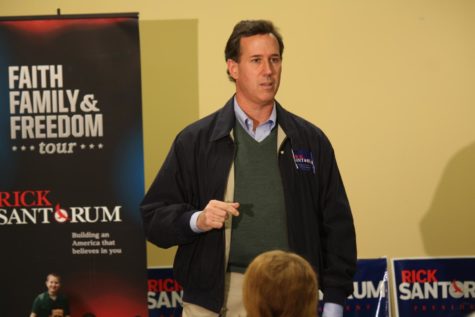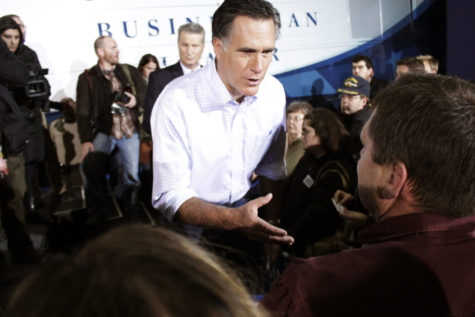Romney edges out Santorum in Iowa caucus by 8 votes
Photo: Kelsey Kremer/Iowa State Daily
Matt Strawn, Republican Party of Iowa chairman, gives a formal announcement declaring Mitt Romney the winner of the Iowa caucus early Wedneday morning. Romney won with 30,015 votes, with former Pennsylvania Sen. Rick Santorum in second with 30,007.
January 4, 2012
Former Massachusetts Gov. Mitt Romney wins the 2012 Iowa caucuses by a mere eight votes over former Pennsylvania Sen. Rick Santorum.
The precincts were packed, Twitter was blowing up and the presidential candidates were waiting nervously on Tuesday night as Iowa Republicans voted in the closest caucus in Iowa’s history.
The night began as the field of candidates finished their Iowa campaigns, some by attending local caucuses and others by retreating to their headquarters, all the while thousands of Iowans went to their local precincts to determine the fate of the candidates.
Early entrance polls showed a strong early start for both Santorum and Texas congressman Ron Paul, with Romney only a couple of percentage points behind.
For the first few hours, all three candidates hovered around 23 to 25 percent. Later in the night, when many rural counties began to fall to Santorum, Paul saw minor setbacks in the cities and Romney saw a gradual boost to put him even with Santorum.
At the end of the night, with 99 percent of precincts reporting, Santorum and Romney were deadlocked at 25 percent and separated by only five votes. This was a close result considering 122,225 voters turned out for the caucus.
The two declared a victory in Iowa, giving speeches before final ballot results were announced. With such a close race, many have now begun to wonder who the real winner of the Iowa caucus was.
“Overall, it has been a very good night for Mitt Romney,” said political science professor Dianne Bystrom. “He didn’t spend nearly the time and effort in Iowa that Santorum did and is still leading the whole pack.”
Despite this, Santorum, who spent much more time in Iowa by traveling to all 99 counties and meeting with Iowa voters, was able to pull out a close second-place finish to Romney, something that two weeks ago may have been unimaginable when he was at the bottom of the polls.
“Santorum did the traditional retail politics but certainly does not have the money and resources that Romney has going forward,” Bystrom said. “The good news about Santorum is that he showed that someone can work really hard and make a name for themselves.”
Political science professor Steffen Schmidt also gave similar credit to Santorum’s work in Iowa, even though Romney was the winner of the Iowa caucuses.
“The big winner tonight is Mitt Romney because Santorum has very little chance at becoming a national leader,” Schmidt said. “Romney will be the eventual nominee because some will see Santorum as too conservative and the third-place finisher, Ron Paul, is not compatible with most Republicans … However, I always thought that the candidate who worked the counties could do pretty well and it certainly paid off for Santorum.”
Up until a week or so ago, Santorum was at the bottom of the polls, often garnering no more than 4 or 5 percent. But after the quick rise and fall of four other conservative Republican candidates, the stars lined up for Santorum at just the right time and he saw a major jump in the polls just days before the caucus. This immediately put Santorum in a contending position with the other frontrunners Romney and Paul.
Paul, who finished in third with 21 percent of the vote, also had a strong turnout on caucus night, especially from young people, many of whom are his most ardent supporters.
“Young people are supporting Paul a lot because of his stances on foreign policy,” Bystrom said. “This really resonates with people. He also appeals to young people because he has a consistent message and hasn’t changed it.”
However, many questions still linger over Paul’s viability as a real Republican presidential nominee.
“Ron Paul has a very devoted base of supporters, but in the Republican Party he can’t get above 21 to 25 percent,” Schmidt said. “That is why Romney will be the nominee and even has a 55 percent chance of winning the election.”
Aside from the top three finishers in Iowa, the results for the rest of the candidates were much different stories. Former Speaker of the House Newt Gingrich finished in fourth place with 13 percent of the vote, Texas Gov. Rick Perry finished in fifth with 10 percent and Minnesota congresswoman Michele Bachmann finished in sixth place with 5 percent.
“The biggest loser of the night is Michele Bachmann,” Schmidt said. “She really tanked and there’s really no place for her to go, so I think she’s finished and Gingrich is going to find it difficult to continue on financially.”
This may be true for Bachmann, but according to reports from the Bachmann camp, the congresswoman vowed to continue on campaigning in South Carolina, the primary following New Hampshire. Gingrich is still expected to campaign in both New Hampshire and South Carolina.
“Rick Perry on the other hand still has a lot of money and can probably compete in the South,” Schmidt said. “This process certainly isn’t over yet and could go a lot longer than most people expect.”
As of Tuesday night, Perry’s camp said the governor will be returning to Texas to “reassess” his campaign after a fifth-place finish in Iowa.









